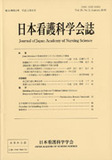Japanese
English
- 販売していません
- Abstract 文献概要
- 参考文献 Reference
要旨
神経疾患患者への退院指導と退院後の患者の問題に関するナースの予測を評価するために,これらが退院1ヶ月後の患者の問題とどの程度対応するかを検討した.神経内科病棟の退院患者107名と病棟ナース21名に自記式質問紙調査を行い,11の問題領域に関して指導・予測・問題発生の有無を調べた.ADLの問題は指導頻度・予測精度とも高いが問題発生頻度も高く,退院後の連携と効果の高い指導が必要である.医療処置・服薬は指導が高頻度で問題の発生も少なく現状を評価できた.これら以外の疾患管理,不安,家族関係,仕事・社会生活,生活上の楽しみ,住宅環境の各問題領域では指導頻度が問題発生頻度に比べて低く,指導がまず必要である.経済の問題では更に予測頻度が低く,ナースの意識向上が課題である.社会資源活用では指導すれば問題が発生しないが,指導せず問題発生した場合も多く,指導の必要な患者の見極めが課題である.
Abstract
This study evaluated the effectiveness of nurses' discharge education and post-discharge patient problem prediction for hospitalized patients experiencing neurological problems. A sample of 21 nurses providing discharge education and 107 patients who received the education at a university- based hospital was studied using survey methodology. Eleven patient problem areas were identified and questionnaires investigated three issues for each area: 1) discharge education; 2) post-discharge patient problem prediction, and 3) actual post-discharge patient problems. Results revealed that the effectiveness of discharge education and the accuracy of patient problem prediction varied according to the problem areas. Activities of daily living (ADL) skills were frequently taught and ADL problems were accurately predicted. However, a significant number of patients continued to experience ADL problems. Information about medical procedures and medication was frequently provided and few patients experienced problems in these areas after discharge. Disease management, anxiety, family dynamics, living environment and social and recreational activities were less frequently discussed in discharge education, were predicted inaccurately and many patients experienced post-discharge problems in these areas. Financial problems were rarely predicted but many patients experienced such difficulties. Generally, patients who received education about social services did not experience problems in accessing them while those who had not received such information had significant related problems. This research highlights a need for nurses to focus discharge education and problem prediction on holistic concerns and not limit it to medical procedures and medication.
Copyright © 2000, Japan Academy of Nursing Science. All rights reserved.


